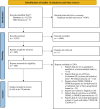Process Evaluations of Diabetes Self-Management Programs: A Systematic Review of the Literature
- PMID: 38648265
- PMCID: PMC11348640
- DOI: 10.1177/08901171241238554
Process Evaluations of Diabetes Self-Management Programs: A Systematic Review of the Literature
Abstract
Objective: To conduct a systematic review of process evaluations (PEs) of diabetes self-management programs (DSMPs).
Data source: An electronic search using Medline (Ovid), Embase (Ovid), CINAHL (Ensco), Academic Search (Ebsco), and APA PsycInfo (Ebsco).
Study inclusion and exclusion criteria: Peer-reviewed, empirical quantitative, qualitative, or mixed-method studies were included if they (1) were a traditional, group-based DSMP, (2) involved adults at least 18 years with T1DM or T2DM, (3) were a stand-alone or embedded PE, and (4) published in English.
Data extraction: The following process evaluation outcomes were extracted: fidelity, dose delivered, dose received, reach, recruitment, retention, and context. Additional items were extracted, (eg, process evaluation type, data collection methods; theories; frameworks or conceptual models used to guide the process evaluation, and etc).
Data synthesis: Due to heterogeneity across studies, studies were synthesized qualitatively (narratively).
Results: Sixty-eight studies (k) in 78 articles (n) (k = 68; n = 78) were included. Most were mixed methods of low quality. Studies were typically integrated into outcome evaluations vs being stand-alone, lacked theoretical approaches to guide them, and incorporated limited outcomes such as dose received, reach, and retention.
Conclusion: Future research should 1) implement stand-alone theoretically grounded PE studies and 2) provide a shared understanding of standardized guidelines to conduct PEs. This will allow public health practitioners and researchers to assess and compare the quality of different programs to be implemented.
Keywords: diabetes; group-based programs; implementation; process evaluation; self-management; traditional.
Conflict of interest statement
Declaration of Conflicting InterestsThe author(s) declared no potential conflicts of interest with respect to the research, authorship, and/or publication of this article.
Figures

Similar articles
-
Beyond the black stump: rapid reviews of health research issues affecting regional, rural and remote Australia.Med J Aust. 2020 Dec;213 Suppl 11:S3-S32.e1. doi: 10.5694/mja2.50881. Med J Aust. 2020. PMID: 33314144
-
The Effectiveness of Integrated Care Pathways for Adults and Children in Health Care Settings: A Systematic Review.JBI Libr Syst Rev. 2009;7(3):80-129. doi: 10.11124/01938924-200907030-00001. JBI Libr Syst Rev. 2009. PMID: 27820426
-
Promoting and supporting self-management for adults living in the community with physical chronic illness: A systematic review of the effectiveness and meaningfulness of the patient-practitioner encounter.JBI Libr Syst Rev. 2009;7(13):492-582. doi: 10.11124/01938924-200907130-00001. JBI Libr Syst Rev. 2009. PMID: 27819974
-
The effectiveness of peer and community health worker-led self-management support programs for improving diabetes health-related outcomes in adults in low- and-middle-income countries: a systematic review.Syst Rev. 2020 Jun 6;9(1):133. doi: 10.1186/s13643-020-01377-8. Syst Rev. 2020. PMID: 32505214 Free PMC article.
-
Safety interventions for the prevention of accidents at work: A systematic review.Campbell Syst Rev. 2022 Jun 1;18(2):e1234. doi: 10.1002/cl2.1234. eCollection 2022 Jun. Campbell Syst Rev. 2022. PMID: 36911341 Free PMC article. Review.
References
-
- International Diabetes Federation . Facts & Figures. Accessed January 17, 2023. https://idf.org/aboutdiabetes/what-is-diabetes/facts-figures.html
Publication types
MeSH terms
LinkOut - more resources
Full Text Sources

